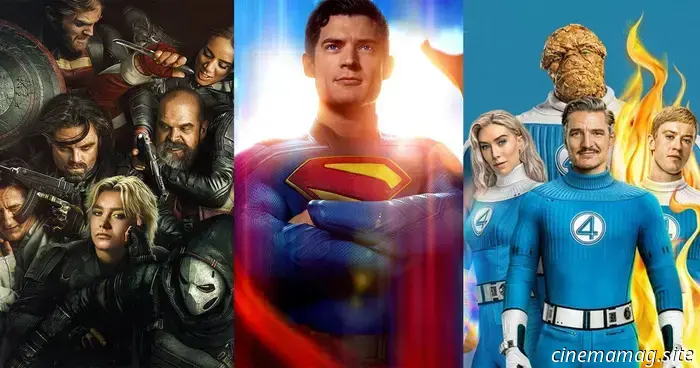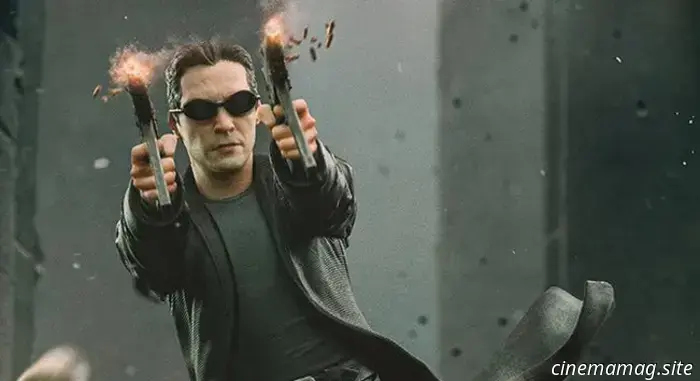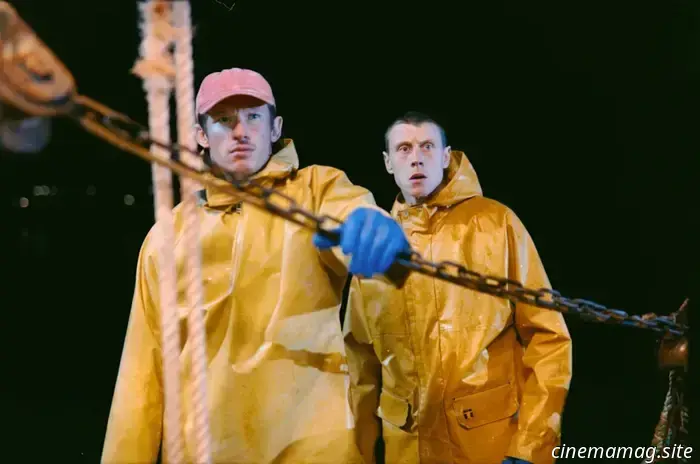
The Issue of Blockbuster Comic Book Movies: The Precipice of Box Office Revenue
Thunderbolts*, Superman, and The Fantastic Four: First Steps appeared to follow the right path, so what led to this year's comic book movie blockbusters struggling at the box office?
For the past five years, Hollywood has been navigating a post-COVID landscape, which has intensified an existing issue: fewer individuals, especially younger audiences, are purchasing movie tickets. Once seen as a guaranteed success, the comic book movie genre lost its appeal. Even lesser-known titles such as Guardians of the Galaxy, which many hadn’t encountered before its film debut, managed to rake in over $750 million.
In a world post-Avengers: Endgame, the abundance of product seemed to have exhausted the audience. Was it merely a case of overabundance? Perhaps. Was it due to a significant decline in quality, with numerous films feeling hastily produced and resembling a corporate meeting of half-baked ideas thrown together? It's very likely, but the issues likely stem from a combination of both, along with other factors.
There's little point in discussing the bleak future of superhero films in 2024—audiences are bored, and studios appear indifferent, either releasing poor-quality films or neglecting to release them altogether. Yet, as the number of tie-in shows dwindles, 2025 seems to hold promise for a fresh restart in the genre with titles like Thunderbolts*, Superman, and The Fantastic Four: First Steps.
Thunderbolts* faced a tricky situation. It featured a disparate group of relatively obscure characters, led by Florence Pugh reprising her role from the largely forgettable Black Widow. Nonetheless, some audiences felt it had been a long time since a significant MCU event occurred.
Superman was an entirely different story, being one of the top-tier characters with a rich history in comics and various media. The iconic blue suit, red cape, and well-groomed hair are globally recognized, alongside Batman, maybe even more so. However, box office expectations were modest from the outset, with the internet rife with disagreements between hopeful new fans, disillusioned old fans of Reeve’s portrayal, and fiercely loyal supporters of Snyder’s vision.
Then there’s the Fantastic Four, a well-known name in pop culture but generally regarded as a lower-tier comic book franchise due to their history of poor film adaptations. In terms of critical reception and fan engagement, there was nowhere to go but up.
All three films received solid reviews from both critics and audiences and, as expected in the nerd culture realm, were divisive, with strong pre-existing biases against the new Superman. Still, the vast majority engaged with and enjoyed each film, notwithstanding the vocal minority who condemned Superman as a disaster.
Theoretically, these films should have reversed the fortunes for their studios and rejuvenated the sub-genre, as well as blockbuster cinema overall. Initially, they all debuted strongly, heralded as the saviors of comic book movies. Thunderbolts* had a robust domestic opening and a decent international showing, aligning with expectations. However, the trouble with relying on tracking data is its inability to predict second-week performance. Those early celebrations proved fleeting. The film ultimately grossed just over $382 million worldwide, which was disappointing given its budget and in comparison to previous comic book movie standards (and acknowledging that the entire landscape has drastically shifted since Black Widow).
Superman had an even bigger legacy to uphold, serving as the centerpiece of the DC Universe relaunch under director James Gunn. As mentioned, the reviews were very positive. Fans, who didn’t pre-judge the film, were mainly satisfied. It opened strongly, which was crucial given its high production costs. Everything seemed to be on track…
So, what went wrong? The issue of significant drop-offs is a crucial factor nowadays. It's increasingly rare for films, especially blockbusters, to maintain their initial audience levels. While Sinners was viewed as a success due to its moderate budget and impressive early retention rates, Superman saw a steep decline in its audience. Only weeks later, Fantastic Four: First Steps debuted, watching Superman fall dramatically in popularity.
Fantastic Four also began with a solid opening that exceeded initial pessimistic forecasts, but again, the subsequent weeks brought significant audience loss. Moreover, it appeared to suffer from a swift change in public sentiment regarding Pedro Pascal, who was suddenly criticized for overexposure and perceived oddness in media, worse yet (apparently) for expressing left-leaning thoughts—ideas of inclusivity and kindness that have been central to comic narratives for decades. Go figure.
At the pinnacle of comic book cinema, when it dominated theaters and even indie broadcasts, I found myself weary of its omnipresence, especially with the obsession over multiverses and complex shared universes that many adults couldn't care less about. Yet, those astonishing box office numbers, often reaching a billion or more, were keeping theaters afloat. Simultaneously, there was a slight resurgence in indie cinema and a welcome revival of mid-budget









Other articles
 Step into the Matrix with the Neo collectible statue from Iron Studios.
Iron Studios has revealed its 1:10 scale Neo statue, which draws inspiration from Keanu Reeves' portrayal in the original installment of the sci-fi action series, The Matrix. This collectible is currently available for pre-order at a price of $219.99; you can check it out here… Step into the Matrix with the Neo statue from Iron Studios’ BDS Art […]
Step into the Matrix with the Neo collectible statue from Iron Studios.
Iron Studios has revealed its 1:10 scale Neo statue, which draws inspiration from Keanu Reeves' portrayal in the original installment of the sci-fi action series, The Matrix. This collectible is currently available for pre-order at a price of $219.99; you can check it out here… Step into the Matrix with the Neo statue from Iron Studios’ BDS Art […]
 Imprint Films unveils the limited edition Jack O'Lantern box set of Halloween I - V in 4K Ultra HD.
Imprint Films has revealed that the initial five movies in the legendary slasher series Halloween will be released in 4K Ultra HD and Blu-ray Steelbook format this October, featuring exclusive Jack O’Lantern pumpkin packaging. Only 1000 copies will be available; see the details and artwork images below… This Limited Edition Jack O’Lantern pumpkin packaging […]
Imprint Films unveils the limited edition Jack O'Lantern box set of Halloween I - V in 4K Ultra HD.
Imprint Films has revealed that the initial five movies in the legendary slasher series Halloween will be released in 4K Ultra HD and Blu-ray Steelbook format this October, featuring exclusive Jack O’Lantern pumpkin packaging. Only 1000 copies will be available; see the details and artwork images below… This Limited Edition Jack O’Lantern pumpkin packaging […]
 Telluride Review: Chloé Zhao’s Hamnet Reinforces the Importance of Art
Hamnet is a remarkable piece of empathy and stands out as Chloé Zhao's most outstanding film by a considerable distance. Based on the 2020 novel by Maggie O'Farrell, who is back as a co-writer, the film beautifully illustrates the significance of art and how the experience of watching something can evoke emotions and foster understanding.
Telluride Review: Chloé Zhao’s Hamnet Reinforces the Importance of Art
Hamnet is a remarkable piece of empathy and stands out as Chloé Zhao's most outstanding film by a considerable distance. Based on the 2020 novel by Maggie O'Farrell, who is back as a co-writer, the film beautifully illustrates the significance of art and how the experience of watching something can evoke emotions and foster understanding.
 Preview of Jeff & Other Marvel Tails #1 - Comic Book
Marvel Comics will launch It's Jeff & Other Marvel Tails #1 next week, and you can check out the official preview below for an early look… THE MARVELOUS TALES OF JEFF THE LAND SHARK & FRIENDS! THE CUTEST AND GOOFIEST MARVEL COLLECTION TO DATE! This special three-in-one edition compiles episodes from the cherished Marvel Unlimited series: IT'S JEFF, [...]
Preview of Jeff & Other Marvel Tails #1 - Comic Book
Marvel Comics will launch It's Jeff & Other Marvel Tails #1 next week, and you can check out the official preview below for an early look… THE MARVELOUS TALES OF JEFF THE LAND SHARK & FRIENDS! THE CUTEST AND GOOFIEST MARVEL COLLECTION TO DATE! This special three-in-one edition compiles episodes from the cherished Marvel Unlimited series: IT'S JEFF, [...]
 Venice Review: Mark Jenkin’s Rose of Nevada is an Astonishing, Time-Bending Ghost Tale
The movies of Mark Jenkin radiate a mesmerizing, disorienting vibe; viewing them envelops you in their erratic transitions through time and place, transforming his native Cornwall into a timeless realm where reality and imagination intertwine within astonishing dioramas. The filmmaker crafts meandering narratives, forever
Venice Review: Mark Jenkin’s Rose of Nevada is an Astonishing, Time-Bending Ghost Tale
The movies of Mark Jenkin radiate a mesmerizing, disorienting vibe; viewing them envelops you in their erratic transitions through time and place, transforming his native Cornwall into a timeless realm where reality and imagination intertwine within astonishing dioramas. The filmmaker crafts meandering narratives, forever
The Issue of Blockbuster Comic Book Movies: The Precipice of Box Office Revenue
Thunderbolts*, Superman and The Fantastic Four: First Steps executed everything correctly, so what led to this year’s comic book movie blockbusters underperforming at the box office? Hollywood has been navigating a post-COVID landscape for the past five years, grappling with an issue that was already escalating. There has been a decline in the number of viewers, especially among younger audiences, […]
